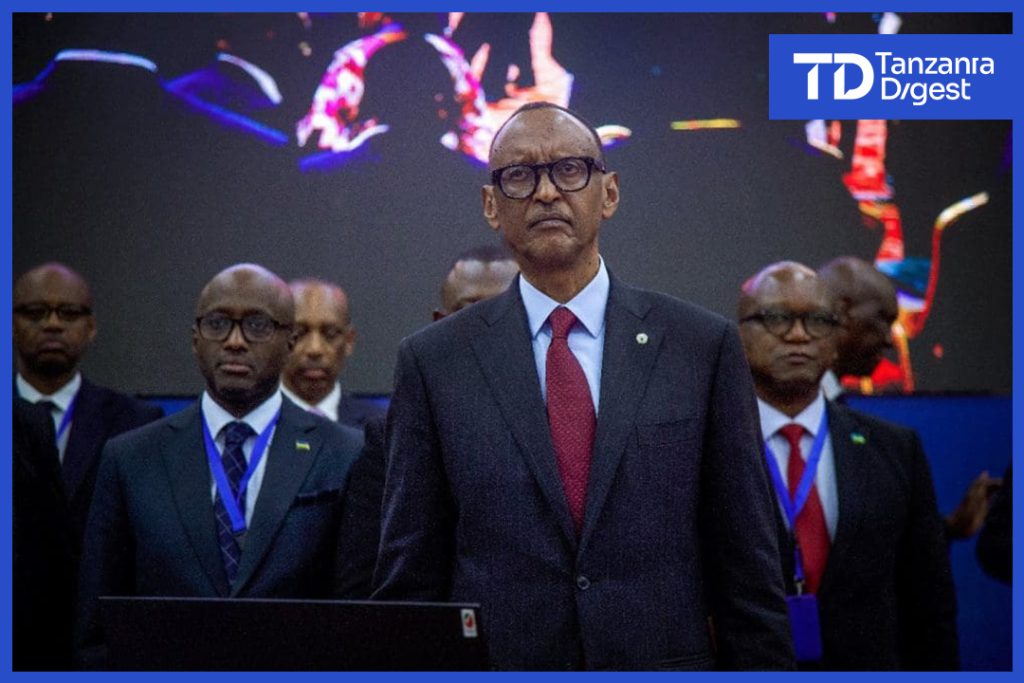Rwanda’s withdrawal from the Economic Community of Central African States (ECCAS) stems from a combination of immediate institutional grievances and deep-seated geopolitical tensions with the Democratic Republic of Congo (DRC). Here’s a breakdown of the key reasons:
🚫 1. Denial of Rotating Chairmanship.
Rwanda was scheduled to assume ECCAS’s rotating chairmanship at the June 7, 2025, summit in Equatorial Guinea, as mandated by Article 6 of the treaty. However, member states—led by the DRC and supported by Burundi—blocked Rwanda’s ascension.
Instead, Equatorial Guinea’s presidency was extended for another year. Rwanda condemned this as a “deliberate violation” of its rights and a capitulation to “DRC’s diktat“.
🎭 2. DRC’s “Instrumentalization” of ECCAS.
Rwanda accuses the DRC of manipulating ECCAS to isolate Rwanda diplomatically. At the summit, ECCAS formally acknowledged “Rwandan aggression” in eastern DRC and demanded Rwandan troops withdraw from Congolese soil—a claim Rwanda denies.
Rwandan officials argue the DRC uses regional bodies to sanction Rwanda despite ongoing peace talks, thereby undermining ECCAS’s founding principles of cooperation and neutrality.
⚔️ 3. Underlying Geopolitical Conflict with the DRC.
The dispute is rooted in the long-standing war in eastern DRC:
– The DRC, UN, and Western powers accuse Rwanda of backing the M23 rebels, who captured key cities like Goma in early 2025. A UN report cited up to 4,000 Rwandan troops fighting alongside rebels.
– Rwanda denies involvement, asserting its border deployments are defensive against Hutu militias (linked to the 1994 genocide) operating in the DRC.
– Despite U.S.-led mediation and peace drafts (notably the April 2025 Washington Declaration), the DRC continued lobbying regional bodies to condemn Rwanda.
📜 4. Historical Grievances and Institutional Distrust.
Rwanda previously quit ECCAS in 2007, rejoining only in 2016. It cites a pattern of exclusion, including being barred from the 2023 ECCAS summit in Kinshasa. Rwanda had protested this “illegal exclusion” to the African Union, but the lack of redress confirmed ECCAS’s “failure to enforce its own rules”
💎 5. Broader Implications:
The withdrawal signals Rwanda’s prioritization of other regional alliances (e.g., the East African Community) and reflects diminishing faith in ECCAS as a neutral forum. The DRC has urged other blocs to adopt similarly “firm stances” against Rwanda, potentially escalating regional fragmentation.
Timeline of Key Events in Rwanda-DRC Relations (2025).
| No. | Date. | Event. |
| 1.0 | March 18. | Rwanda and DRC leaders hold talks in Doha, Qatar. |
| 2.0 | April 25. | Foreign ministers sign peace declaration in Washington. |
| 3.0 | June 7. | ECCAS denies Rwanda chairmanship; extends Equatorial Guinea’s term. |
| 4.0 | June 8. | Rwanda announces ECCAS withdrawal. |
In essence, Rwanda’s exit is both a protest against procedural marginalization within ECCAS and a response to the unresolved conflict with the DRC, which has poisoned regional diplomacy. The move underscores the bloc’s vulnerability to bilateral disputes and raises questions about its future cohesion.
Is Rwanda arming M23 and mining in the East DRC?
Based on extensive evidence from UN reports, international investigations, and regional analyses, Rwanda is actively arming the M23 rebel group and facilitating the illegal exploitation of minerals in eastern DRC. Here’s a detailed breakdown:
⚔️ 1. Rwanda’s Military Support for M23.
– Direct Troop Deployment:
UN experts confirm 3,000–4,000 Rwandan Defense Forces (RDF) troops are embedded with M23 in eastern DRC, providing combat support, training, and advanced weaponry (e.g., Israeli anti-tank missiles).
– Operational Control:
Rwandan officers command M23 units, plan offensives (including the capture of Goma and Bukavu), and supply satellite-jamming technology to disrupt Congolese drones.
– Recruitment and Logistics:
Rwanda hosts M23 training camps, forcibly recruits children, and channels weapons through its border. The UN labels RDF’s role as “de facto control” of M23 operations.
💎 2. Illegal Mineral Exploitation and Smuggling:
– M23’s Mining Monopoly:
After capturing Rubaya (home to 15% of global tantalum reserves), M23 imposed a “tax regime” on coltan mining, smuggling 120 tonnes monthly to Rwanda via widened border roads. This generates ~$800,000/month for the group.
– Rwanda’s Economic Gain:
Rwanda’s coltan exports doubled from 2021–2023 (1,000 to 2,000 tonnes), despite minimal domestic reserves. UN reports attribute 90% of these exports to smuggled Congolese minerals.
– Supply Chain Complicity:
European commodity trader Traxys purchased 280 tonnes of Rwandan coltan in 2024, with investigations revealing ties to conflict zones. Rwandan exporters like African Panther Resources mix Congolese coltan with local ore to mask origins.
🛡️ 3. Rwanda’s Justifications and Denials.
– Security Claims:
Rwanda cites threats from Hutu militias (FDLR) in eastern DRC, framing interventions as “defensive measures“.
– Rebuttals of Evidence:
President Kagame dismisses UN reports as “imaginary,” despite geolocated data showing RDF troops in Congolese towns like Sake.
🌍 4. International Responses:
– Sanctions and Condemnation:
The UN Security Council demanded Rwanda withdraw troops and cease M23 support. The EU sanctioned M23 leaders and Rwandan officers in March 2025.
– Diplomatic Fallout:
Rwanda withdrew from the Central African bloc (ECCAS) after being denied its rotating presidency, accusing the DRC of “instrumentalizing” the group.
📊 Key Evidence Snapshot.
Table: Documented Links Between Rwanda, M23, and Mineral Exploitation.
| No. | Aspect. | Evidence. | Source. |
| 1.0 | Troop Deployment. | 3,000–4,000 RDF soldiers embedded with M23 in DRC. | UN Experts. |
| 2.0 | Weapon Transfers. | Advanced arms (122mm rockets, anti-tank missiles) supplied to M23. | BBC. |
| 3.0 | Mineral Smuggling. | 120 tonnes/month of coltan smuggled from Rubaya to Rwanda. | Mongabay. |
| 4.0 | Financial Flows. | M23 earns $800,000/month from “taxing” coltan; Traxys imports conflict minerals. | Global Witness. |
💎 Conclusion
Rwanda’s dual strategy of military backing for M23 and systematic mineral smuggling constitutes a violation of international law, fuels regional instability, and perpetuates humanitarian crises in eastern DRC.
Despite Rwandan denials, cross-verified evidence from UN monitors, NGOs, and trade data confirms state complicity. International pressure—including sanctions and supply chain reforms—remains critical to curtailing these activities .
Read more analysis by Rutashubanyuma Nestory

